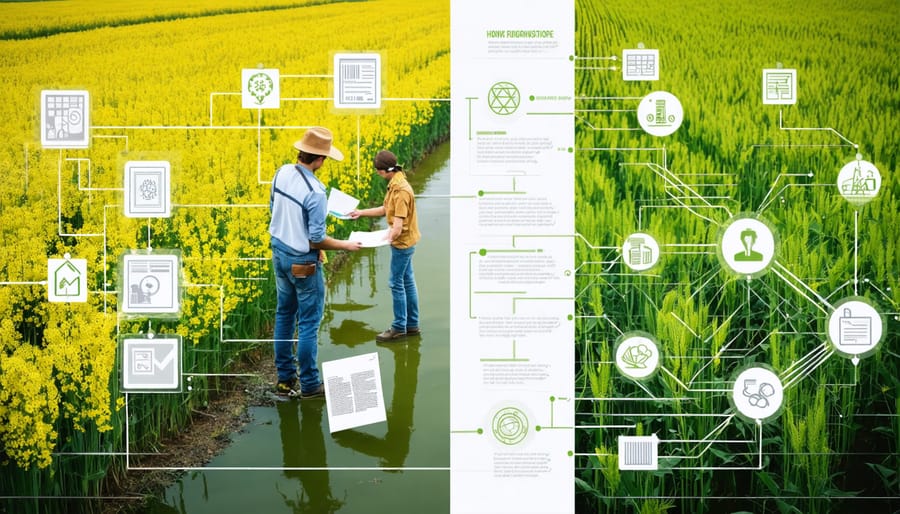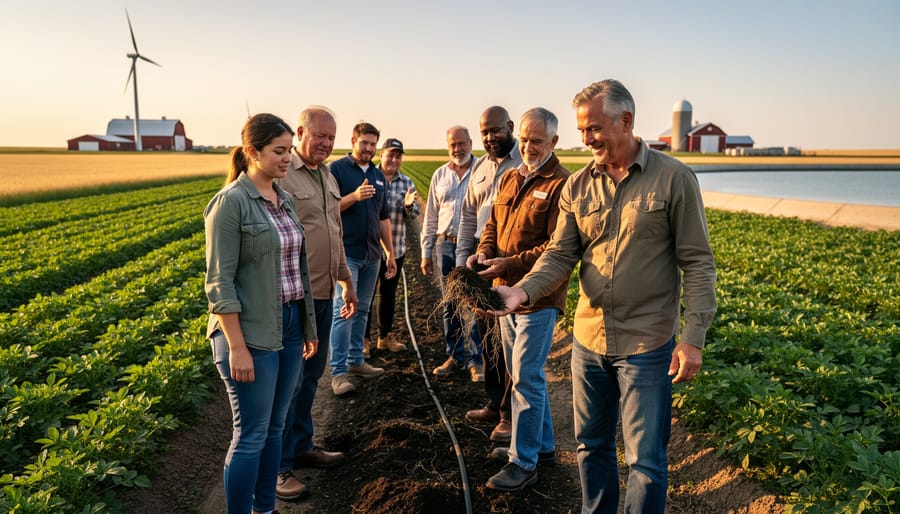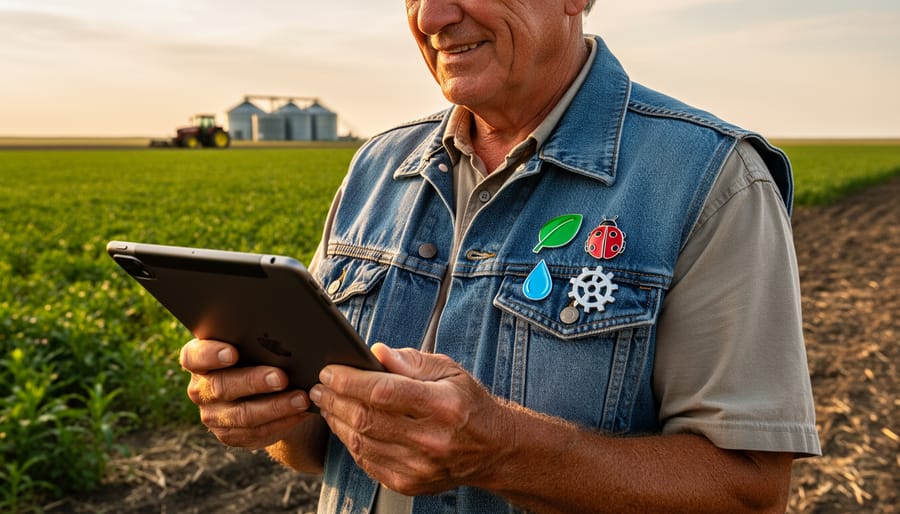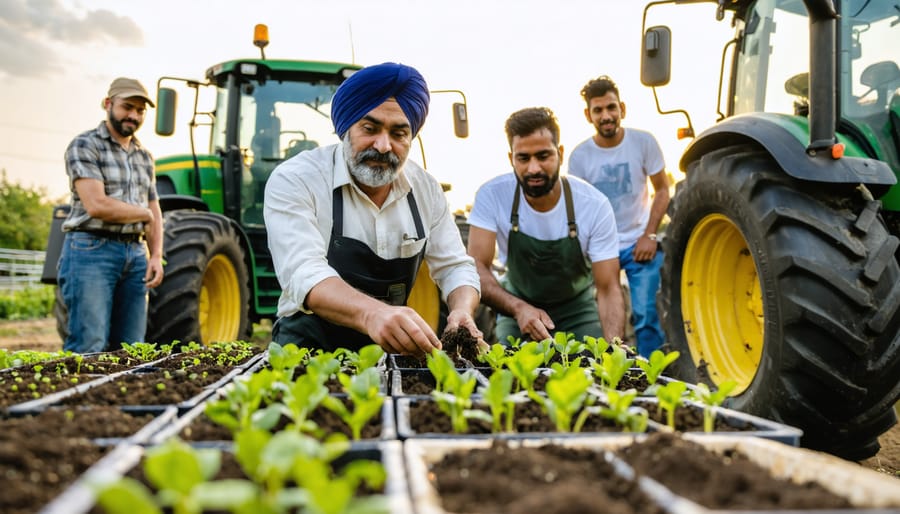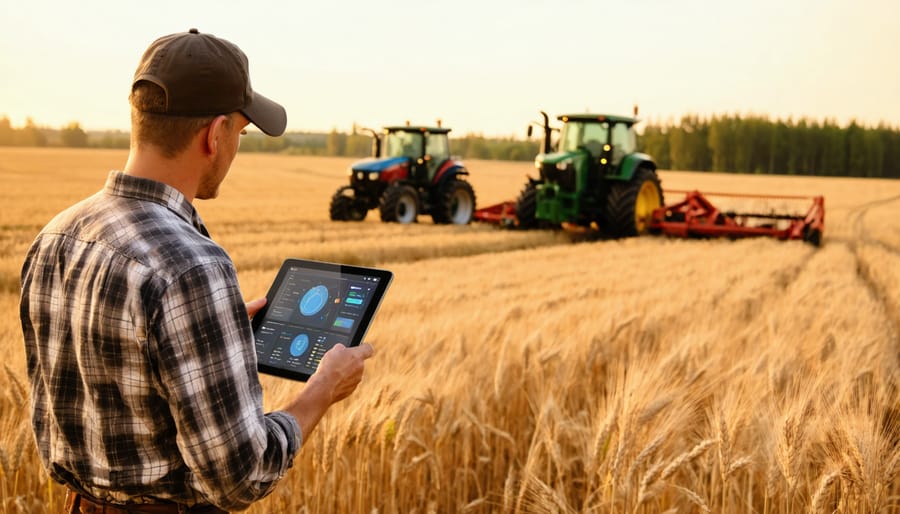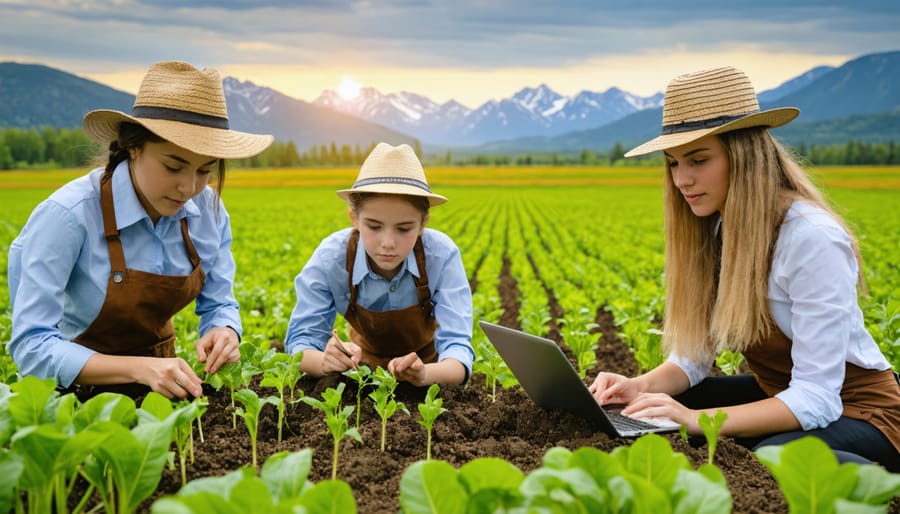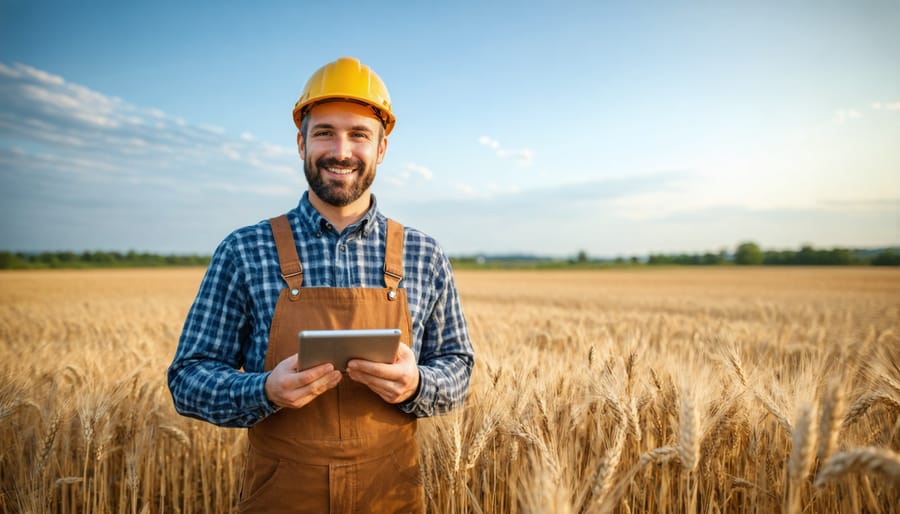Blockchain technology is revolutionizing food production across Alberta’s agricultural landscape, offering farmers unprecedented control over their supply chains and data management. From field to fork, this digital ledger system creates an unbreakable chain of transparency that’s already helping Prairie farmers secure premium prices for their crops and strengthen consumer trust.
Canadian producers implementing blockchain solutions have reported up to 30% increases in market value for their products, particularly in high-value organic and specialty crop markets. By recording every step of production—from seed selection to harvest timing, storage conditions, and transportation—blockchain provides the authentication that today’s consumers demand and buyers require.
For Alberta’s agricultural community, blockchain represents more than just technology; it’s becoming an essential tool for competitiveness in global markets. Whether tracking canola from Lethbridge to international buyers or verifying the journey of Peace Country wheat, this system ensures every bushel tells its complete story, backed by immutable digital proof.
The transformation is already underway, with pioneering farms across the province demonstrating how blockchain can reduce paperwork, streamline certification processes, and create new revenue opportunities through enhanced traceability and quality assurance.

Why Alberta Farmers Are Turning to Blockchain
Real Benefits for Canadian Farmers
Canadian farmers implementing blockchain technology are seeing tangible benefits in both domestic and international markets. Alberta beef producers using blockchain traceability systems have reported premium prices, with some achieving 15-20% higher returns compared to conventional sales channels. These systems allow farmers to verify their sustainable practices and quality standards, meeting the growing consumer demand for transparent food sourcing.
In Saskatchewan, grain farmers using blockchain platforms have gained direct access to specialty markets in Asia, cutting out multiple intermediaries and increasing their profit margins by up to 12%. The technology enables them to prove the origin and quality of their crops, particularly important for organic and specialty grain producers.
Maritime farmers have successfully used blockchain to track wild blueberry harvests, leading to increased trust from European buyers and long-term contracts. The system has helped reduce payment processing times from weeks to days, improving cash flow for participating farms.
British Columbia wine producers have leveraged blockchain to combat counterfeiting, protecting their brand value and ensuring authentic Canadian products reach international markets. This has resulted in increased market share and stronger relationships with distributors in key export markets.
Current Traceability Pain Points
Alberta farmers face several key challenges when it comes to proving the origin and quality of their agricultural products. Traditional paper-based documentation systems are time-consuming and prone to errors, making it difficult to maintain accurate records across the supply chain. Many producers struggle with tracking products from field to market, especially when dealing with multiple intermediaries and transportation methods.
Weather events, storage conditions, and handling procedures all impact product quality, yet capturing and sharing this information reliably remains complicated. Small and medium-sized farms often lack the resources for sophisticated tracking systems, while larger operations struggle with integrating data from various sources and locations.
Cross-border trade adds another layer of complexity, requiring farmers to provide detailed documentation for regulatory compliance and quality assurance. The current system’s fragmentation makes it challenging to respond quickly to food safety concerns or verify sustainability claims that consumers increasingly demand.
These traceability gaps can result in reduced market access, lower premium pricing opportunities, and difficulties in building trust with buyers and consumers. The need for a more transparent, efficient system has become increasingly apparent as global supply chains grow more complex.
Getting Started with Blockchain on Your Farm
Essential Tools and Technologies
To implement blockchain technology in agriculture, farmers need a combination of hardware and software tools. The foundation starts with reliable internet connectivity and smart devices like tablets or smartphones for field data collection. These devices work seamlessly with digital agronomy solutions and blockchain platforms.
Essential hardware includes IoT sensors for monitoring soil conditions, weather stations for real-time climate data, and RFID tags for livestock tracking. Many Alberta farmers are already using GPS systems for precision agriculture, which can be integrated with blockchain solutions.
For software requirements, farms need:
– A blockchain platform (like HyperLedger or AgriLedger)
– Smart contract capability
– Digital wallet software
– Data management system
– Mobile apps for field operations
Cloud storage solutions are crucial for maintaining distributed ledgers and ensuring data accessibility. Security tools, including encryption software and authentication systems, protect sensitive farm data and transactions.
Most importantly, these tools should be user-friendly and compatible with existing farm management systems. Local agricultural technology providers in Alberta offer integrated solutions that combine these elements into practical packages. Many provide training and support to help farmers transition smoothly to blockchain-based systems.
Remember, you don’t need to implement everything at once. Start with basic tools and gradually expand your digital infrastructure as your comfort level and needs grow.
Integration with Existing Farm Systems
Integrating blockchain technology with your existing farm operations doesn’t have to be overwhelming. Many Alberta farmers are already using farm management applications that can be connected to blockchain platforms with minimal disruption to daily operations.
Start by identifying your current digital touchpoints – such as GPS tracking systems, yield monitors, or weather stations. These can serve as data entry points for your blockchain system. Many modern tractors and implements already collect valuable data that can be automatically fed into blockchain networks.
For example, the Thompson family farm in Red Deer successfully integrated their existing soil moisture sensors and crop monitoring systems with blockchain technology in just three weeks. They maintained their familiar equipment while adding new capabilities for data verification and sharing.
Consider working with local agricultural technology providers who understand both traditional farming practices and blockchain implementation. Many offer integration packages specifically designed for Canadian farming conditions and regulatory requirements.
Key steps for smooth integration include:
– Auditing current digital systems and identifying connection points
– Training farm staff on new data entry procedures
– Establishing backup systems for critical operations
– Gradually phasing in blockchain features while maintaining existing workflows
– Regular system testing during off-peak farming periods
Remember, integration doesn’t mean replacing what works – it’s about enhancing your current systems with improved traceability and data management capabilities.
Success Stories: Alberta Farms Using Blockchain
Organic Grain Operation Success
Red Deer Valley Organics, a family-owned operation located just outside of Drumheller, Alberta, implemented blockchain technology in 2021 to track their organic grain production from seed to sale. Owner Sarah Thompson initially sought to strengthen trust with her premium-paying organic buyers and streamline certification processes.
The farm integrated a user-friendly blockchain platform that connects with their existing farm management software. Field workers use a mobile app to log daily activities, including seeding dates, weather conditions, and organic pest management practices. Each batch of grain receives a unique digital identifier, allowing buyers to trace its journey through the supply chain.
Within the first year, the system helped reduce certification paperwork by 60% and cut audit preparation time from two weeks to just three days. More importantly, their organic wheat commands a 12% premium from processors who value the transparent verification of growing practices.
“The blockchain system gives our buyers confidence in our organic claims,” explains Thompson. “We can show them exactly how their grain was grown, when it was harvested, and how it was stored. That transparency has opened doors to new markets, particularly with organic food manufacturers in British Columbia.”

Cattle Ranch Traceability Innovation
Bar S Ranch in southern Alberta has become a pioneer in blockchain-based cattle traceability, implementing a system that tracks their 2,500-head operation from birth to market. Ranch owner Sarah Thompson partnered with a Canadian tech startup to develop a solution that uses RFID tags and blockchain technology to maintain detailed records of each animal’s life cycle.
The system records crucial data points including vaccination schedules, feed sources, and movement between pastures. Each animal’s information is stored on an immutable blockchain ledger, accessible to buyers, veterinarians, and regulatory bodies. This transparency has helped Bar S Ranch command premium prices in the market, with buyers willing to pay 15% more for their verifiably traced cattle.
“We’ve seen a remarkable improvement in our operation’s efficiency,” says Thompson. “What used to take hours of paperwork now happens automatically, and our customers appreciate knowing exactly where their beef comes from.”
The implementation has also streamlined compliance with Canadian Food Inspection Agency requirements and simplified the export certification process. The success at Bar S Ranch has inspired neighbouring operations to explore similar solutions, creating a growing network of blockchain-enabled cattle ranches across Alberta.
Environmental Benefits and Sustainability Impact
Blockchain technology is revolutionizing how we track and validate sustainable farming practices across Alberta and beyond. By creating an immutable record of agricultural activities, blockchain enables farmers to demonstrate their environmental stewardship while building trust with consumers who increasingly demand eco-friendly products.
One of the most significant environmental benefits comes from improved carbon tracking and credits. Alberta farmers can now accurately measure and verify their carbon sequestration efforts, from no-till farming to cover cropping. This transparency has led to better recognition and compensation for climate-positive farming methods, with some producers seeing up to 15% premium on their certified low-carbon products.
Water management has also seen remarkable improvements through blockchain implementation. Farmers in Southern Alberta are using smart contracts to track irrigation usage and watershed protection efforts, resulting in a 20% reduction in water consumption across participating farms. The technology provides real-time monitoring of water quality and usage patterns, helping farmers optimize their irrigation schedules while protecting local water resources.
The system’s ability to trace inputs and outputs has encouraged more farmers to adopt regenerative agriculture practices. By documenting soil health improvements, biodiversity measures, and reduced chemical usage, producers can demonstrate their environmental impact to consumers and certification bodies. This transparency has led to increased adoption of organic farming methods, with blockchain-verified organic operations growing by 30% in the past year alone.
For Alberta’s agricultural community, blockchain technology isn’t just about compliance – it’s about creating a more sustainable future while maintaining profitable operations. The data-driven insights help farmers make informed decisions about resource management while proving their commitment to environmental stewardship.
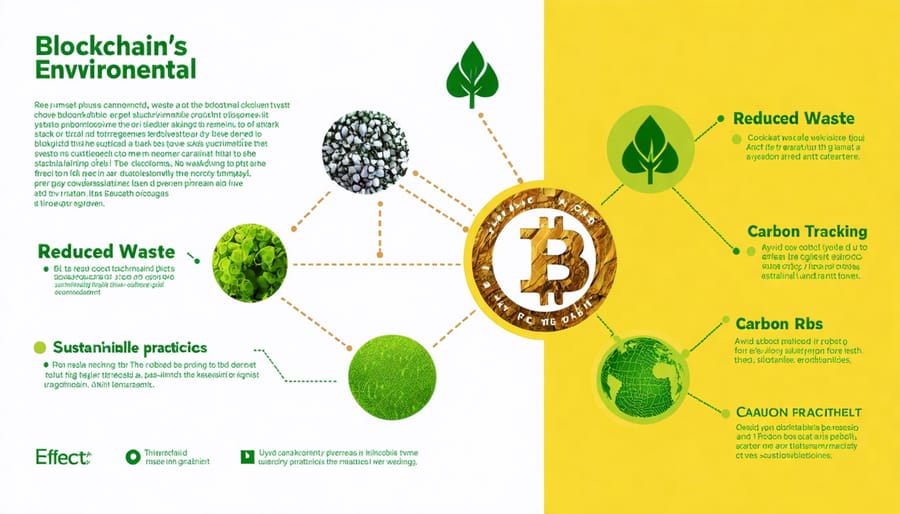
Blockchain technology offers transformative potential for Canadian agriculture, providing unprecedented transparency, efficiency, and security in our food supply chains. From tracking crop origins to streamlining payments and certifications, these digital solutions can help Alberta farmers stay competitive in an evolving global market.
For farmers considering blockchain adoption, the journey begins with identifying specific needs within your operation. Start by connecting with local agricultural technology providers and exploring pilot programs through organizations like Alberta Agriculture and Forestry. Many successful implementations begin with small-scale trials, such as tracking a single crop variety or managing relationships with specific buyers.
The next steps include evaluating available platforms, consulting with tech-savvy peers who have already adopted blockchain solutions, and potentially joining blockchain-focused agricultural cooperatives. Remember that you don’t need to navigate this transition alone – numerous resources and support networks exist within our farming community.
As we move forward, blockchain adoption will likely become increasingly important for maintaining market access and meeting consumer demands for transparency. By taking measured steps today, you’ll be well-positioned to thrive in tomorrow’s digital agricultural landscape while maintaining the values and practices that make Canadian farming unique.

